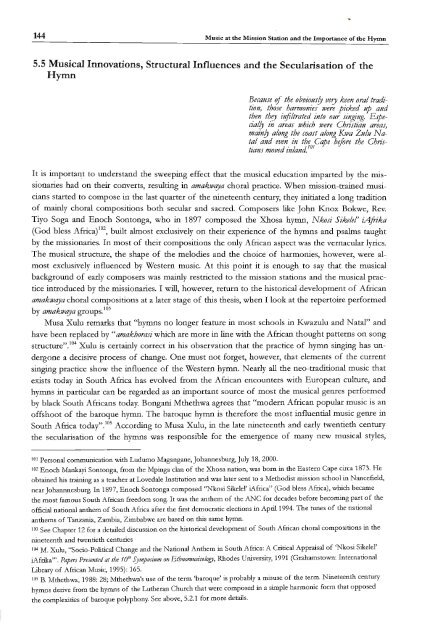South African Choral Music (Amakwaya): Song, Contest and the ...
South African Choral Music (Amakwaya): Song, Contest and the ...
South African Choral Music (Amakwaya): Song, Contest and the ...
Create successful ePaper yourself
Turn your PDF publications into a flip-book with our unique Google optimized e-Paper software.
144 <strong>Music</strong> at <strong>the</strong> Mission Station <strong>and</strong> <strong>the</strong> Importance of<strong>the</strong> Hymn<br />
5.5 <strong>Music</strong>al Innovations, Structural Influences <strong>and</strong> <strong>the</strong> Secularisation of <strong>the</strong><br />
Hymn<br />
Because of <strong>the</strong> obviouslY very keen oral tradition,<br />
those harmonies were picked up <strong>and</strong><br />
<strong>the</strong>n thry infiltrated into our singing. EspeciallY<br />
in areas which were Christian areas,<br />
mainlY along <strong>the</strong> coast along Kwa Zulu Natal<br />
<strong>and</strong> even in <strong>the</strong> Cape bifore <strong>the</strong> Christians<br />
moved inl<strong>and</strong>. IOf<br />
It is important to underst<strong>and</strong> <strong>the</strong> sweeping effect that <strong>the</strong> musical education imparted by <strong>the</strong> missionaries<br />
had on <strong>the</strong>ir converts, resulting in amakwqya choral practice. When mission-trained musicians<br />
started to compose in <strong>the</strong> last quarter of <strong>the</strong> nineteenth century, <strong>the</strong>y initiated a long tradition<br />
of mainly choral compositions both secular <strong>and</strong> sacred. Composers like John Knox Bokwe, Rev.<br />
Tiyo Soga <strong>and</strong> Enoch Sontonga, who in 1897 composed <strong>the</strong> Xhosa hymn, Nkosi Sikelei'iAfrika<br />
(God bless Africa)102, built almost exclusively on <strong>the</strong>ir experience of <strong>the</strong> hymns <strong>and</strong> psalms taught<br />
by <strong>the</strong> missionaries. In most of <strong>the</strong>ir compositions <strong>the</strong> only <strong>African</strong> aspect was <strong>the</strong> vernacular lyrics.<br />
The musical structure, <strong>the</strong> shape of <strong>the</strong> melodies <strong>and</strong> <strong>the</strong> choice of harmonies, however, were almost<br />
exclusively influenced by Western music. At this point it is enough to say that <strong>the</strong> musical<br />
background of early composers was mainly restricted to <strong>the</strong> mission stations <strong>and</strong> <strong>the</strong> musical practice<br />
introduced by <strong>the</strong> missionaries. I will, however, return to <strong>the</strong> historical development of <strong>African</strong><br />
amakwqya choral compositions at a later stage of this <strong>the</strong>sis, when I look at <strong>the</strong> repertoire performed<br />
by amakwqya groups. 103<br />
Musa Xulu remarks that "hymns no longer feature in most schools in Kwazulu <strong>and</strong> Natal" <strong>and</strong><br />
have been replaced by "amakhorasi which are more in line with <strong>the</strong> <strong>African</strong> thought patterns on song<br />
structure".104 Xulu is certainly correct in his observation that <strong>the</strong> practice of hymn singing has undergone<br />
a decisive process of change. One must not forget, however, that elements of <strong>the</strong> current<br />
singing practice show <strong>the</strong> influence of <strong>the</strong> Western hymn. Nearly all <strong>the</strong> neo-traditional music that<br />
exists today in <strong>South</strong> Africa has evolved from <strong>the</strong> <strong>African</strong> encounters with European culture, <strong>and</strong><br />
hymns in particular can be regarded as an important source of most <strong>the</strong> musical genres performed<br />
by black <strong>South</strong> <strong>African</strong>s today. Bongani M<strong>the</strong>thwa agrees that "modern <strong>African</strong> popular music is an<br />
offshoot of <strong>the</strong> baroque hymn. The baroque hymn is <strong>the</strong>refore <strong>the</strong> most influential music genre in<br />
<strong>South</strong> Africa today".lOs According to Musa Xulu, in <strong>the</strong> late nineteenth <strong>and</strong> early twentieth century<br />
<strong>the</strong> secularisation of <strong>the</strong> hymns was responsible for <strong>the</strong> emergence of many new musical styles,<br />
101 Personal communication with Ludumo Magangane,Johannesburg,July 18, 2000.<br />
102 Enoch Mankayi Sontonga, from <strong>the</strong> Mpinga clan of <strong>the</strong> Xhosa nation, was born in <strong>the</strong> Eastern Cape circa 1873. He<br />
obtained his training as a teacher at Lovedale Institution <strong>and</strong> was later sent to a Methodist mission school in Nancefield,<br />
near Johannnesburg. In 1897, Enoch Sontonga composed "Nkosi Sikelel' iAfrica" (God bless Africa), which became<br />
<strong>the</strong> most famous <strong>South</strong> <strong>African</strong> freedom song. It was <strong>the</strong> an<strong>the</strong>m of <strong>the</strong> ANC for decades before becoming part of <strong>the</strong><br />
official national an<strong>the</strong>m of <strong>South</strong> Africa after <strong>the</strong> first democratic elections in April 1994. The tunes of <strong>the</strong> national<br />
an<strong>the</strong>ms of Tanzania, Zambia, Zimbabwe are based on this same hymn.<br />
103 See Chapter 12 for a detailed discussion on <strong>the</strong> historical development of <strong>South</strong> <strong>African</strong> choral compositions in <strong>the</strong><br />
nineteenth <strong>and</strong> twentieth centuries<br />
104 M. Xulu, "Socio-Political Change <strong>and</strong> <strong>the</strong> National An<strong>the</strong>m in <strong>South</strong> Africa: A Critical Appraisal of 'Nkosi Sikelel'<br />
iAfrika"'. Papers Presented at <strong>the</strong> 10 th Symposium on Ethnomusic%gy, Rhodes University, 1991 (Grahamstown: International<br />
Library of <strong>African</strong> <strong>Music</strong>, 1995): 165.<br />
105 B. M<strong>the</strong>thwa, 1988: 28; M<strong>the</strong>thwa's use of <strong>the</strong> term 'baroque' is probably a misuse of <strong>the</strong> term. Nineteenth century<br />
hymns derive from <strong>the</strong> hymns of <strong>the</strong> Lu<strong>the</strong>ran Church that were composed in a simple harmonic form that opposed<br />
<strong>the</strong> complexities of baroque polyphony. See above, 5.2.1 for more details.

















